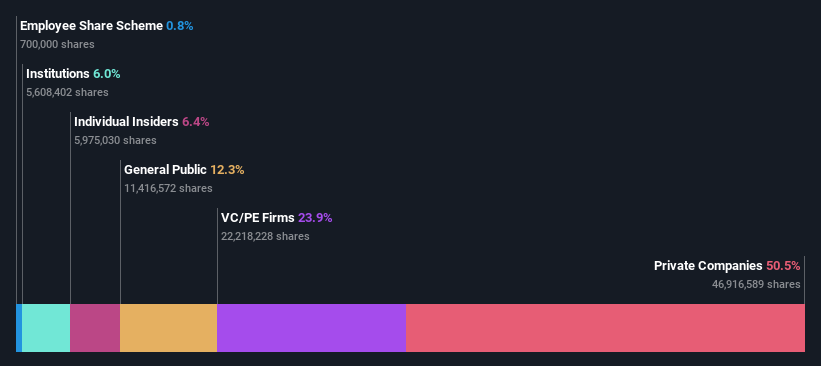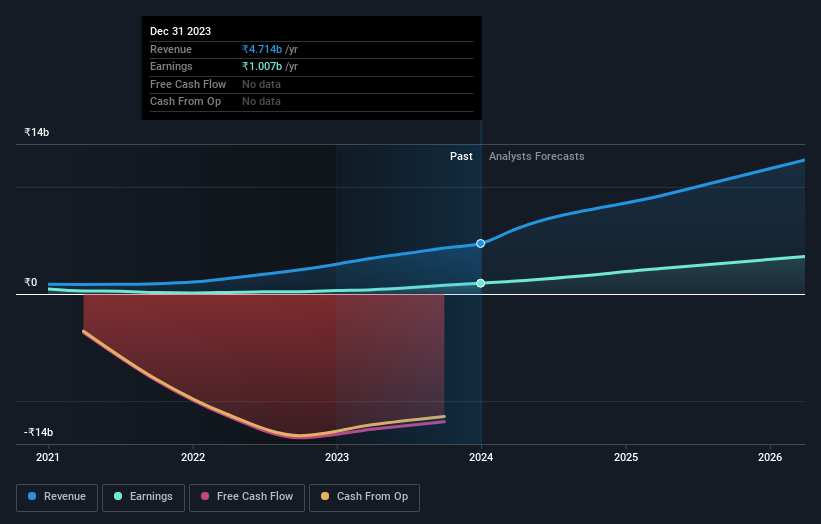- India
- /
- Capital Markets
- /
- NSEI:UGROCAP
Private companies in UGRO Capital Limited (NSE:UGROCAP) are its biggest bettors, and their bets paid off as stock gained 10% last week

Key Insights
- UGRO Capital's significant private companies ownership suggests that the key decisions are influenced by shareholders from the larger public
- 65% of the business is held by the top 4 shareholders
- Ownership research, combined with past performance data can help provide a good understanding of opportunities in a stock
If you want to know who really controls UGRO Capital Limited (NSE:UGROCAP), then you'll have to look at the makeup of its share registry. And the group that holds the biggest piece of the pie are private companies with 51% ownership. In other words, the group stands to gain the most (or lose the most) from their investment into the company.
Clearly, private companies benefitted the most after the company's market cap rose by ₹2.5b last week.
Let's take a closer look to see what the different types of shareholders can tell us about UGRO Capital.
View our latest analysis for UGRO Capital

What Does The Institutional Ownership Tell Us About UGRO Capital?
Institutional investors commonly compare their own returns to the returns of a commonly followed index. So they generally do consider buying larger companies that are included in the relevant benchmark index.
As you can see, institutional investors have a fair amount of stake in UGRO Capital. This suggests some credibility amongst professional investors. But we can't rely on that fact alone since institutions make bad investments sometimes, just like everyone does. When multiple institutions own a stock, there's always a risk that they are in a 'crowded trade'. When such a trade goes wrong, multiple parties may compete to sell stock fast. This risk is higher in a company without a history of growth. You can see UGRO Capital's historic earnings and revenue below, but keep in mind there's always more to the story.

UGRO Capital is not owned by hedge funds. IFU is currently the company's largest shareholder with 16% of shares outstanding. The second and third largest shareholders are Danish Sustainable Development Goals Investment Fund K/S and NewQuest Asia Investments III Limited, with an equal amount of shares to their name at 16%. In addition, we found that Shachindra Nath, the CEO has 2.2% of the shares allocated to their name.
Our research also brought to light the fact that roughly 65% of the company is controlled by the top 4 shareholders suggesting that these owners wield significant influence on the business.
While it makes sense to study institutional ownership data for a company, it also makes sense to study analyst sentiments to know which way the wind is blowing. There is a little analyst coverage of the stock, but not much. So there is room for it to gain more coverage.
Insider Ownership Of UGRO Capital
While the precise definition of an insider can be subjective, almost everyone considers board members to be insiders. Management ultimately answers to the board. However, it is not uncommon for managers to be executive board members, especially if they are a founder or the CEO.
Insider ownership is positive when it signals leadership are thinking like the true owners of the company. However, high insider ownership can also give immense power to a small group within the company. This can be negative in some circumstances.
We can see that insiders own shares in UGRO Capital Limited. In their own names, insiders own ₹1.7b worth of stock in the ₹26b company. This shows at least some alignment. You can click here to see if those insiders have been buying or selling.
General Public Ownership
The general public-- including retail investors -- own 12% stake in the company, and hence can't easily be ignored. This size of ownership, while considerable, may not be enough to change company policy if the decision is not in sync with other large shareholders.
Private Equity Ownership
With a stake of 24%, private equity firms could influence the UGRO Capital board. Sometimes we see private equity stick around for the long term, but generally speaking they have a shorter investment horizon and -- as the name suggests -- don't invest in public companies much. After some time they may look to sell and redeploy capital elsewhere.
Private Company Ownership
It seems that Private Companies own 51%, of the UGRO Capital stock. It might be worth looking deeper into this. If related parties, such as insiders, have an interest in one of these private companies, that should be disclosed in the annual report. Private companies may also have a strategic interest in the company.
Next Steps:
It's always worth thinking about the different groups who own shares in a company. But to understand UGRO Capital better, we need to consider many other factors. Case in point: We've spotted 2 warning signs for UGRO Capital you should be aware of, and 1 of them can't be ignored.
Ultimately the future is most important. You can access this free report on analyst forecasts for the company.
NB: Figures in this article are calculated using data from the last twelve months, which refer to the 12-month period ending on the last date of the month the financial statement is dated. This may not be consistent with full year annual report figures.
New: AI Stock Screener & Alerts
Our new AI Stock Screener scans the market every day to uncover opportunities.
• Dividend Powerhouses (3%+ Yield)
• Undervalued Small Caps with Insider Buying
• High growth Tech and AI Companies
Or build your own from over 50 metrics.
Have feedback on this article? Concerned about the content? Get in touch with us directly. Alternatively, email editorial-team (at) simplywallst.com.
This article by Simply Wall St is general in nature. We provide commentary based on historical data and analyst forecasts only using an unbiased methodology and our articles are not intended to be financial advice. It does not constitute a recommendation to buy or sell any stock, and does not take account of your objectives, or your financial situation. We aim to bring you long-term focused analysis driven by fundamental data. Note that our analysis may not factor in the latest price-sensitive company announcements or qualitative material. Simply Wall St has no position in any stocks mentioned.
About NSEI:UGROCAP
UGRO Capital
A non-banking financial company, engages in the lending business in India.
High growth potential and good value.
Similar Companies
Market Insights
Community Narratives




